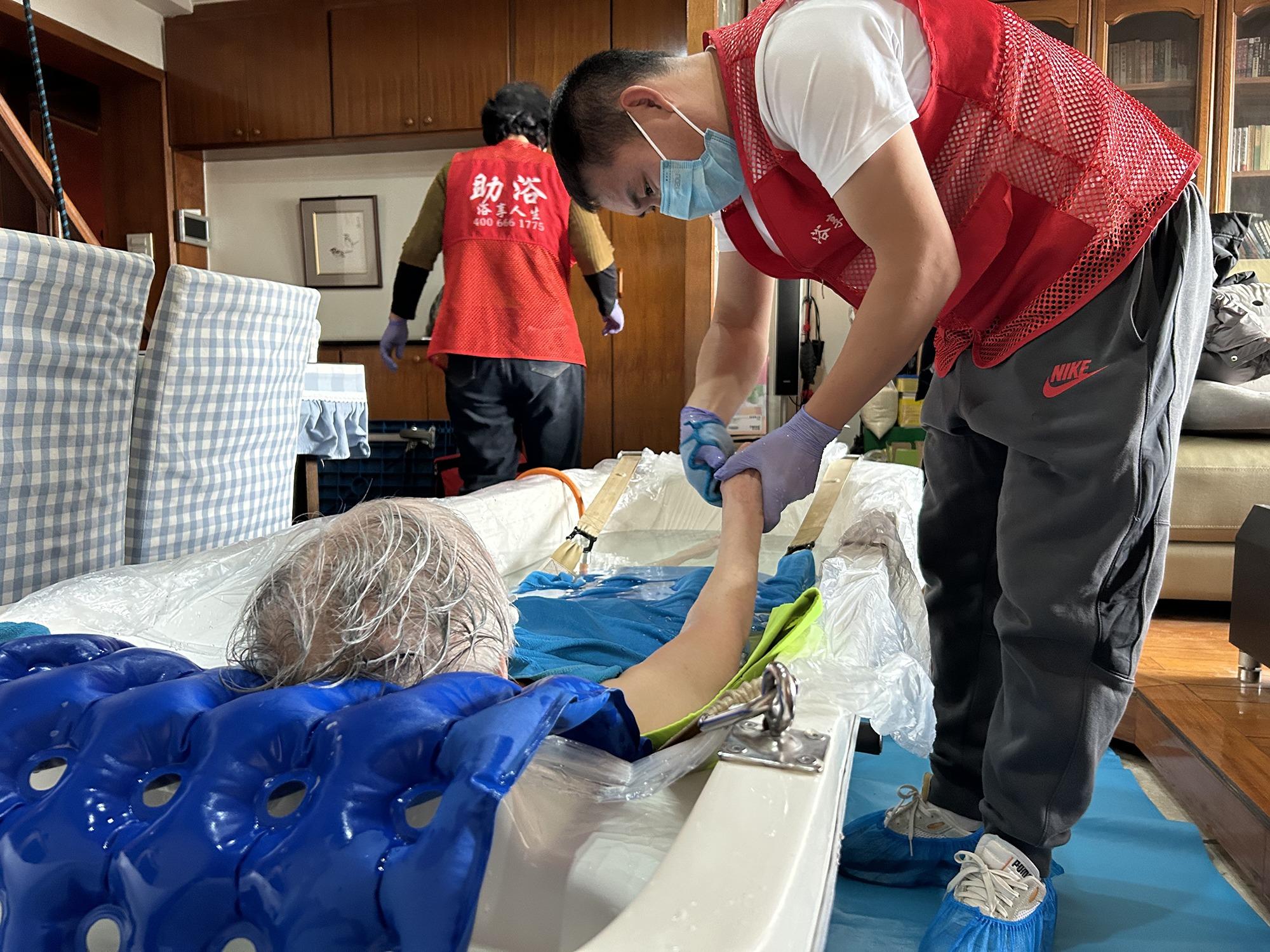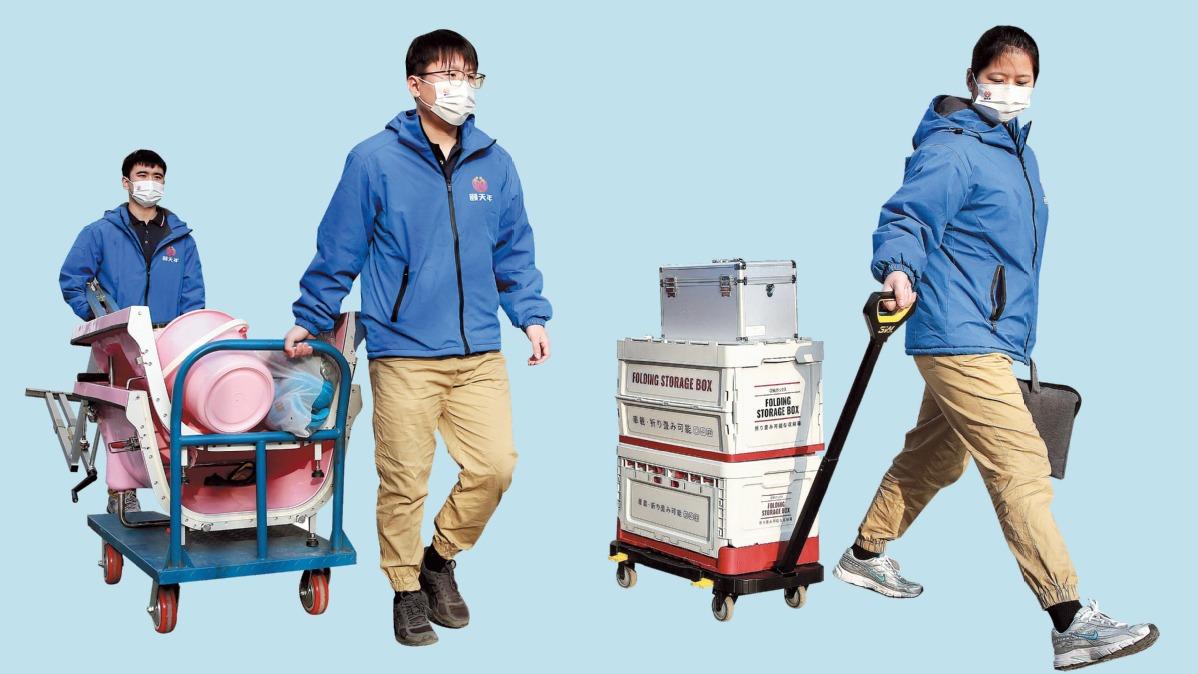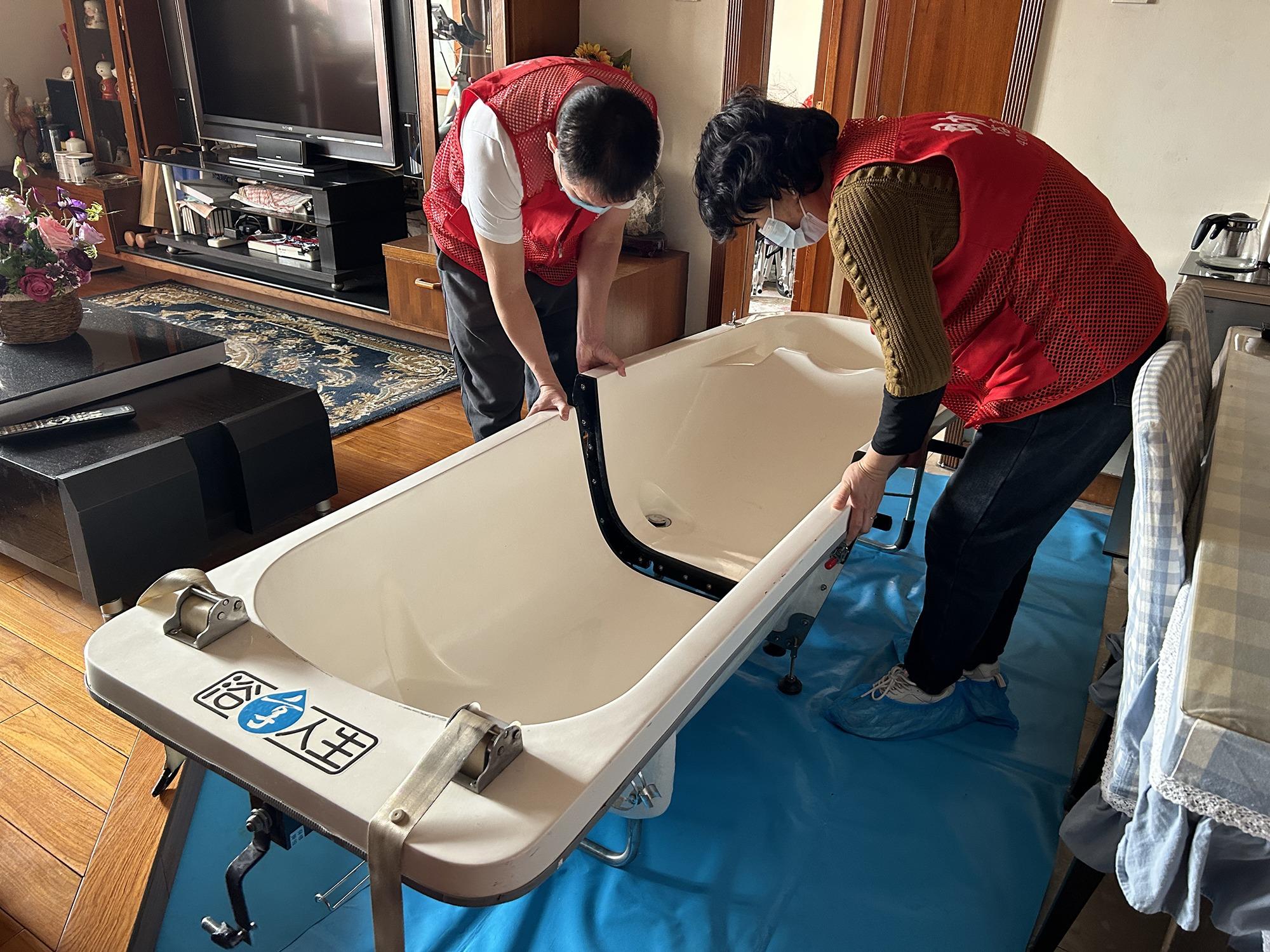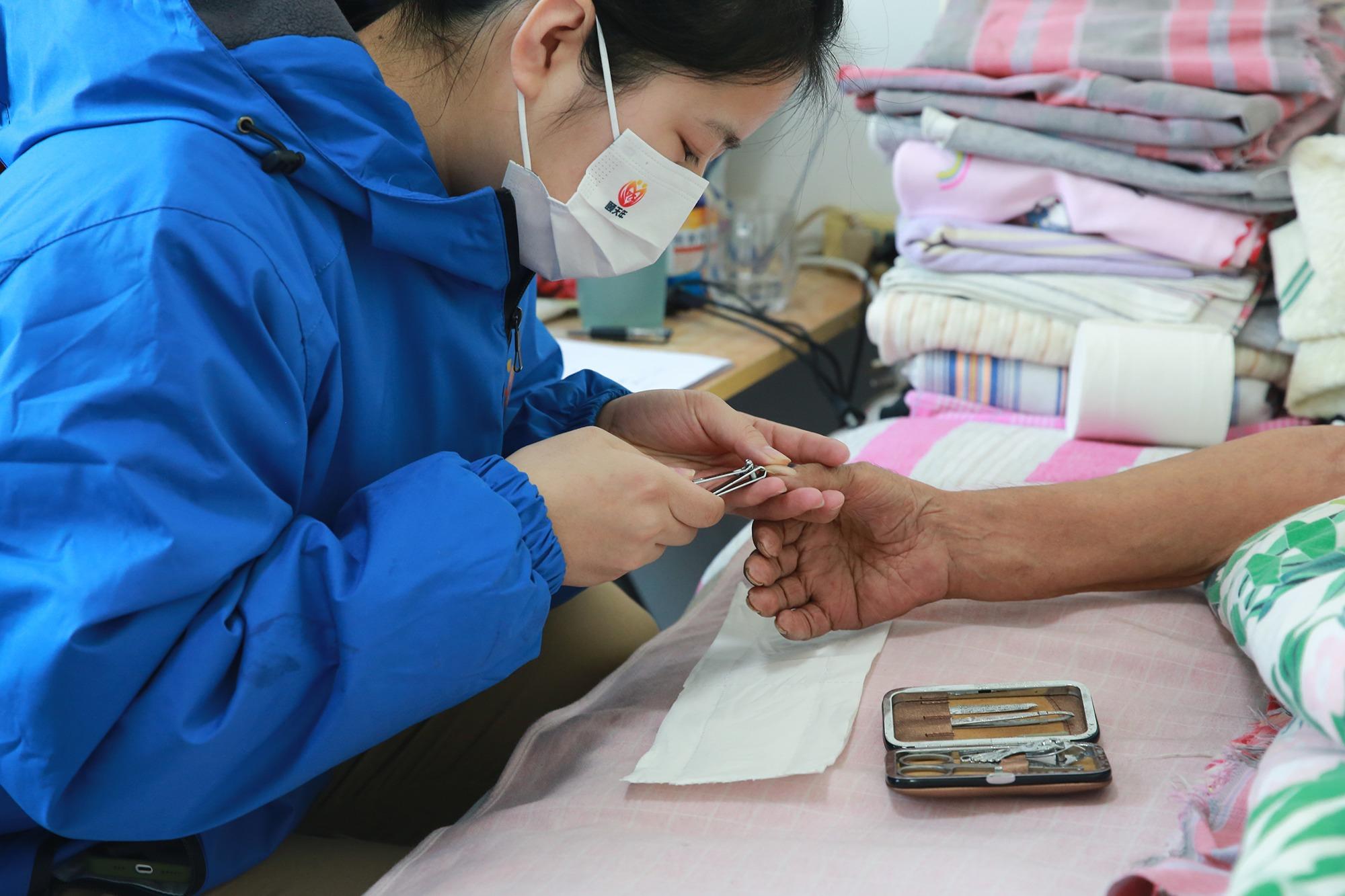Assisted bathing services attract increased demand
 A senior resident receives an assisted bathing service at home in Beijing. Such services have become increasingly popular. (PROVIDED TO CHINA DAILY)
A senior resident receives an assisted bathing service at home in Beijing. Such services have become increasingly popular. (PROVIDED TO CHINA DAILY)
As the number of seniors in China continues to rise, assisted bathing services are improving their quality of life and giving them more dignity.
Members of such teams do everything they can to help elderly clients, who in many cases have not taken a bath for a long time.
Li Xinnian, a 78-year-old resident of the Yonghua Xincheng residential community in Handan, Hebei province, was persuaded to try an in-home bathing service by his children.
He had difficulty moving after experiencing a stroke last year, and had not taken a bath since, because he was afraid of slipping and falling down.
"My family used to help me clean myself with a wet towel," he said.
On a friend's recommendation, his daughter, Li Yingli, contacted a local company that provides in-home bathing services.
Li Xinnian said, "I initially felt a little embarrassed with other people washing me, and didn't really want to be bathed at all."
His daughter said, "But after being bathed, my father's skin became rosier, and even his eyes looked brighter." She added that her father now wants to use the bathing service every month.
"These services not only improve the quality of life for seniors such as my father, but give them more dignity and free them from various skin problems," she added.
The company providing the service was established in Handan last year by Jia Yunfei, who used to be a volunteer at a nursing home, where he found many seniors did not bathe for months due to mobility issues.
Realizing that most people face difficulties washing themselves as they age, the 25-year-old started to focus on the business potential of the assisted bathing industry.
Jia traveled to several places, including Beijing and Liaoning province, to learn about the industry, and in October last year, he established Handan Shan'ende Home Care Services Co, which specializes in assisted home bathing services for the elderly.
"Our service requires at least three attendants," said Jia, who approached local talent markets to recruit staff members, but found it hard to find professionals for this new industry.
Instead, he recruited people with experience in household services, and trained them in more than 30 nursing skills, including disinfection, measuring blood oxygen levels, and even performing cardiopulmonary resuscitation.
After two months' practical training, Jia and his employees officially started the business.
"However, although we had many inquiries, very few appointments were made with the company," Jia said.
To promote the business, he started offering free bathing services to relatives, friends and seniors in nursing homes.
In early January, Jia received his first paid order. "I believed there would be great demand for our service," he said.
He and his team developed a set of standardized work procedures, which included signing service agreements, taking blood pressure and pulse readings, trimming nails, cutting hair, and disinfecting bathtubs.
"We will only provide our service if the elderly meet certain health conditions, such as their blood oxygen level being above 92 and systolic blood pressure below 140," he said.
As the reputation of his business has risen, so has the number of its orders — from an average of two a month to more than 20. To date, Jia's team has served over 200 seniors, with regular clients accounting for 30 percent of his clientele.
Gao Weimin, Jia's wife, who used to be a dance teacher but resigned last year to become an assisted bathing attendant with her husband, said, "I hope that more standardized guidelines will be introduced for this industry to ensure that it develops in a safe and healthy manner.
"I feel a great sense of accomplishment when I see seniors feeling comfortable after a bath."
Du Peng, director of Renmin University of China's Institute of Gerontology, said, "Assisted bathing services are essential, as many elderly people go for a long time without taking a bath, even if they live with their children."
Assisted bathing is one of the basic care services for the elderly, and is necessary for improving their quality of life, Du added.
Many small companies and teams who provide these services nationwide have been particularly busy in places such as Beijing and Taiyuan, capital of Shanxi province, he said.
 Jia Yunfei (first left) and his team provide an assisted bathing service for a senior resident in Handan, Hebei province. (FAN WENPING / FOR CHINA DAILY)
Jia Yunfei (first left) and his team provide an assisted bathing service for a senior resident in Handan, Hebei province. (FAN WENPING / FOR CHINA DAILY)
Company launch
In 2018, Wang Jianchun, 47, launched a company in Beijing similar to that founded by Jia and his wife in Handan.
Named Yuxiangrensheng, or Bath and Enjoy Life, the company had served some 700 seniors as of the end of last year.
"Usually, a male and female attendant form a team, so they can provide services for people of different genders," Wang said, adding that an attendant of the same gender as the senior helps with undressing and washing private body parts.
During bathing, seniors are covered with a towel, for both warmth and modesty, said Wang, whose team generally caters to three to four seniors a day.
"If there are too many customers, the attendants become tired, and any mistakes could have serious consequences, as numerous seniors have health issues," Wang said.
During peak seasons, usually in summer, the team handles about 60 orders a month, and some 40 to 50 at other times, he added.
Unlike Jia and his wife in Hebei, most of Wang's employees are in the 40-50 age bracket.
"The technical thresholds for this job are not that high, but it requires people who are gentle and caring," Wang said.
"We ask the senior's family members to stay with us as we carry out the service, as they know more about the person's health conditions, and can help avoid accidents," Wang said. He added that the bathing time is not that long, as many elderly people have underlying conditions such as hypertension and heart disease.
"Most of them cannot soak in warm water for long, as they may experience shortness of breath or tightening in the chest, which is very dangerous," he added.
"As many people need assisted bathing, we are willing to provide this service."
 Assisted bathing attendants install a bathtub at a client's home in Beijing. (PROVIDED TO CHINA DAILY)
Assisted bathing attendants install a bathtub at a client's home in Beijing. (PROVIDED TO CHINA DAILY)
Lack of information
Due to a lack of information, it is often difficult to contact seniors, Wang said, adding, "This industry started relatively late in China, so public awareness of it needs to be expanded."
Du, from Renmin University, said that to ensure a smooth flow of information, an intermediary organization, such as a community service center, is needed to put seniors in need in touch with reliable institutions or companies that provide bathing services.
"Without policy support and relevant information, it will be challenging for such companies to develop, and some elderly people will not know where to find these services," he added.
Data from the National Bureau of Statistics show that by the end of last year, the number of people who were 60 or older comprised 19.8 percent of China's population. More than 209.78 million of them were 65 or older, accounting for 14.9 percent of the total.
"Due to the impact of the baby boom in 1963, this year will witness the largest net increase to date in the elderly population," Du said.
He predicts that starting this year, China's elderly population will increase rapidly until 2052, when the number of seniors will begin to fall.
"However, in terms of meeting the demand for assisted bathing services, the number of providers is limited," Du said.
Furthermore, these services carry certain risks, and bathing attendants need to have professional qualifications, Du added.
Wang, manager of the company in Beijing, said, "More people in China started to become involved in the industry this year, but I believe that some of them have quit because of poor financial rewards, among other reasons.
"Others are waiting for the market to mature before entering it. There will always be people who need such services, so I choose to stick with this job."
Liu Benyou, 49, a male bathing assistant in Chongqing, is confident and optimistic about his work. He started in the job in 2018, and has become experienced in the role.
"It is very challenging to assist disabled or partially disabled seniors, as they do not bathe frequently, which in most cases leaves them with body odor and looking dirty," Liu said.
He thinks that being a bathing attendant requires compassion.
"In addition, some elderly people may have a poor view of life, so we need to pay attention to our own attitude," Liu said.
He added that in Qingdao, Shandong province, a man in his 80s shed tears of gratitude after being helped to take a bath. "He told me he had never had such a comfortable bath as a senior," Liu said.
Long Quanming, 60, founder of Chongqing Sunshine Eldercare Service, where Liu works, said, "Assisted bathing attendants provide timely help for many families."
The company, which was founded in 2016, specializes in bathing services.
After seeing the bathing difficulties experienced by his father, who became partially disabled after breaking his tailbone in 2015, Long developed an interest in caring for seniors.
He and his two siblings took care of their father at home, but bathing him was a particularly troublesome issue for them.
"None of us were professionals, so it was quite difficult to give him a bath," Long said.
 Gao Weimin, an assisted bathing attendant, cuts the nails of a senior resident in Handan. (FAN WENPING / FOR CHINA DAILY)
Gao Weimin, an assisted bathing attendant, cuts the nails of a senior resident in Handan. (FAN WENPING / FOR CHINA DAILY)
In 2017, Long designed an assisted bathing cabin, which has been awarded three national patents. The cabin was assembled from special materials with insulation functions, and equipped with a bathtub, shower, wash basin and other facilities.
Long installed the equipment in his home to bathe his father. One day, a relative saw it and expressed an interest in installing such a cabin at his home.
However, Long found that the relative's home did not have the right conditions for the cabin.
"At the time, I thought why not create a shared bathtub? We could use a mobile bathing vehicle to enter the community to provide bathing services," he said.
In 2018, his vision became reality with the launch of Chongqing's first bathing demonstration center for seniors, which features mobile bathing vans that initially provided free services. The center was jointly launched by the Chongqing Charity Federation, the Chongqing Pension Service Association and Long's company.
The mobile bathing vans provide services in residential communities, nursing institutions and villages.
"At that time, this public welfare project was free, and the elderly formed long lines to be bathed. But when charges were introduced, the lines dried up," Long said, adding that the charges were not a long-term solution.
After considering the situation for six months, he thought that the authorities, philanthropists and the seniors' children should pay for the bathing services.
Finally, a fund was established, with the first donation made by a local company, which covered the bathing expenses of 3,000 people.
"The scenes of seniors lining up to use the bathing vans promptly returned," Long said.
Moreover, local governments from more than 20 districts and counties in Chongqing have purchased services from Long's company for seniors.
The company, which has more than 30 attendants, operates 10 bathing vans in Chongqing, which have also provided services some 60,000 times in a dozen cities nationwide, including Qingdao and Zunyi, Guizhou province.
The services will be extended to other areas of the country, including Guangxi Zhuang autonomous region and Henan province, and Long said it is estimated that the number of vans in operation will rise to 100 next year.
"I will continue to develop the bathing business for seniors, and become a pioneer in the field of healthy bathing for the elderly," Long said.
Support received
People such as Long have received government support for their businesses.
A circular released on Feb 21 last year said the State Council issued a guideline to promote the development of national undertakings for the aged and improve the elderly care service system during the 14th Five-Year Plan period (2021-25).
The circular emphasized support for the development of various facilities, including community bathing centers, mobile bathing vehicles, and home bathing services.
It also highlighted promoting the research and development of products related to bathing services, and the use of economically practical products.
Guo Haijun, director of Handan Civil Affairs Bureau's elderly care service department, believes the government should also introduce relevant policies and regulations to strengthen supervision of the industry.
"If it is left unregulated and allowed to grow wildly, there will be problems such as difficulty in identifying service risks, resolving disputes, and safeguarding people's rights," Guo said.
In addition, the industry should strengthen skills training, improve service quality, and introduce appropriate insurance cover to meet seniors' needs, he said, adding, "This will truly play a beneficial role in care services for the elderly."
Yang Zishuo in Beijing contributed to this story.
Contact the writers at zhangyu1@chinadaily.com.cn


